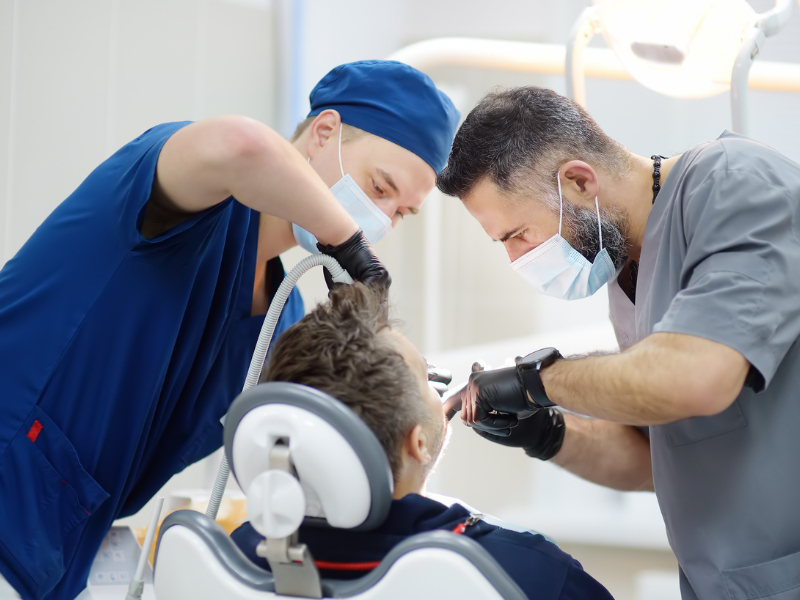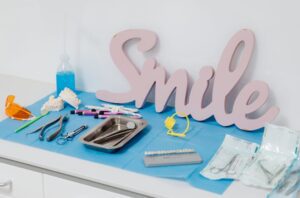The frustrating thing about emergencies is that they are completely unpredictable. Just as you never know if you might accidentally trip on the stairs and break your arm, you never really know when you might be faced with a dental emergency.
When you or a family member falls and chips part of a tooth, it can be hard to get past the panic and actually figure out what to do.
To make the process less stressful, we’ll also explain here what you should do when faced with common dentistry emergencies.
While many dental issues can be uncomfortable, not all require immediate attention. To help distinguish the two situations, we’ve come up with a few pointers to help decided if you need immediate dental assistance.
Severe Pain: If you are in severe pain it is not likely to go away without the help of a trained professional
Excessive Bleeding: Bleeding from the gums can be caused by a number of things, but excessive bleeding, or bleeding that won’t stop, is an indication of a more serious issue that should be dealt with immediately
Tooth Loss: If you have lost a tooth there is a good chance that it can be put back in place and not permanent damage will result, but only if you get to the dentist right away.
Swelling: If you have excessive swelling you need to make sure you don’t have a serious infection or an abscessed tooth that will only get worse if not treated.
On the other hand, a dull ache in a tooth, a small chip, or loosing a crown or filling can probably wait for a few days until you can get a scheduled appointment. If you are unsure then air on the safe side and give us a call so our trained staff can advise you on the best course of action.
Often, when people think about emergency dental situations they think of skateboarding accidents or something traumatic causing major damage to teeth and gums. While that does account for some cases, there are many less serious issues that may require immediate dental care.
TOOTHACHES
One of the most common tooth-related maladies is the infamous toothache. Ranging from a slight twinge to unbelievably painful, toothaches often seem like they spring up for no reason at all.
When faced with a toothache, you should carefully rinse your mouth with warm water and floss. It is possible that the pain is being caused by something stuck in the mouth. If this doesn’t work, it may be time to call us.
Part of the problem is answering the question “what causes toothaches” is no small task. Toothaches can arise from a wide variety of different things, from an abscess or cavity, to a fracture or a filling falling out. Unfortunately, because of the wide range of possibilities you shouldn’t try self-diagnosing or self-medicating it. Instead, if the pain persists, you should visit your dentist to get a professional’s opinion.
CHIPPED OR CRACKED TOOTH
Another common type of tooth damage is a chip or crack in a tooth. Although teeth are made from a relatively strong material, they can still chip, break off pieces, or crack (fracture) when faced with blunt trauma.
Just like diagnosing a toothache, the first thing you should do if you or a family member ever chip or crack a tooth is immediately rinse out your mouth with warm water. When you do this, take special care to spit out (not swallow!) any pieces of the tooth that might have fallen out. Carefully clean and gather these pieces in case your dentist might need to see them.
Your next priority should be stopping any bleeding in the mouth. Applying a piece of gauze and putting pressure on the area can help the bleeding stop faster. Be especially careful if the damaged tooth has sharp edges — sealing the area in a piece of dental wax or cement can help make sure the tooth doesn’t cause any more problems.
Sometimes, you can crack a tooth without it falling out, especially if it’s under a crown. The symptoms of a cracked tooth under a crown include pain while chewing, biting, or releasing a bite, sensitivity to temperatures, swelling of gums, or pain that comes and goes.
If you know, or suspect, you’ve chipped or cracked a tooth you should visit your dentist in Anchorage as soon as possible.
With cracks or chips, the sooner you get professional treatment, the greater chance you have of saving the tooth and a complete recovery. Dentists can easily polish, file down, or repair cracked and chipped teeth.
KNOCKED-OUT TOOTH (AVULSED TOOTH)
Finally, it’s also possible for a tooth to become avulsed (or knocked out). With an avulsed tooth, reacting quickly is vital. If you can get the tooth replaced within 30 minutes, you’re almost certain to recover, and the longer you wait, the more likely that tooth will be rejected when you try to replace it.
If you ever knock out a tooth, you should first clean out both your mouth and the tooth with water. Be careful not to touch the root of the tooth while doing so. If at all possible, you should try placing the tooth back in the socket by lining up the root and pressing it gently into place. The key here isn’t the positioning — your dentist can fix the positioning at any time — but rather making sure your gums don’t “forget” the tooth and reject it later on.
If you are unable to put the tooth back in, you should keep the tooth as moist as possible. Place the tooth in a cup of milk, inside your cheek, or in a special ADA approved preservation product (available at your pharmacy) before rushing to the dentist as soon as possible.
Immediate Dental Care in Anchorage Alaska
Again, we cannot emphasize this enough: dental emergencies can be dealt with easily if you get to a dentist as soon as possible. Mint Dental Alaska is always available for treating new patients in Anchorage, so if you are ever faced with a dental emergency, you should call (907) 646-8670 or visit our website at Mint Dental to set up an emergency appointment with one of our dentists.
At Mint Dental we are here to help you with years of experience and we are happy to lend you the full benefits of our expertise.







